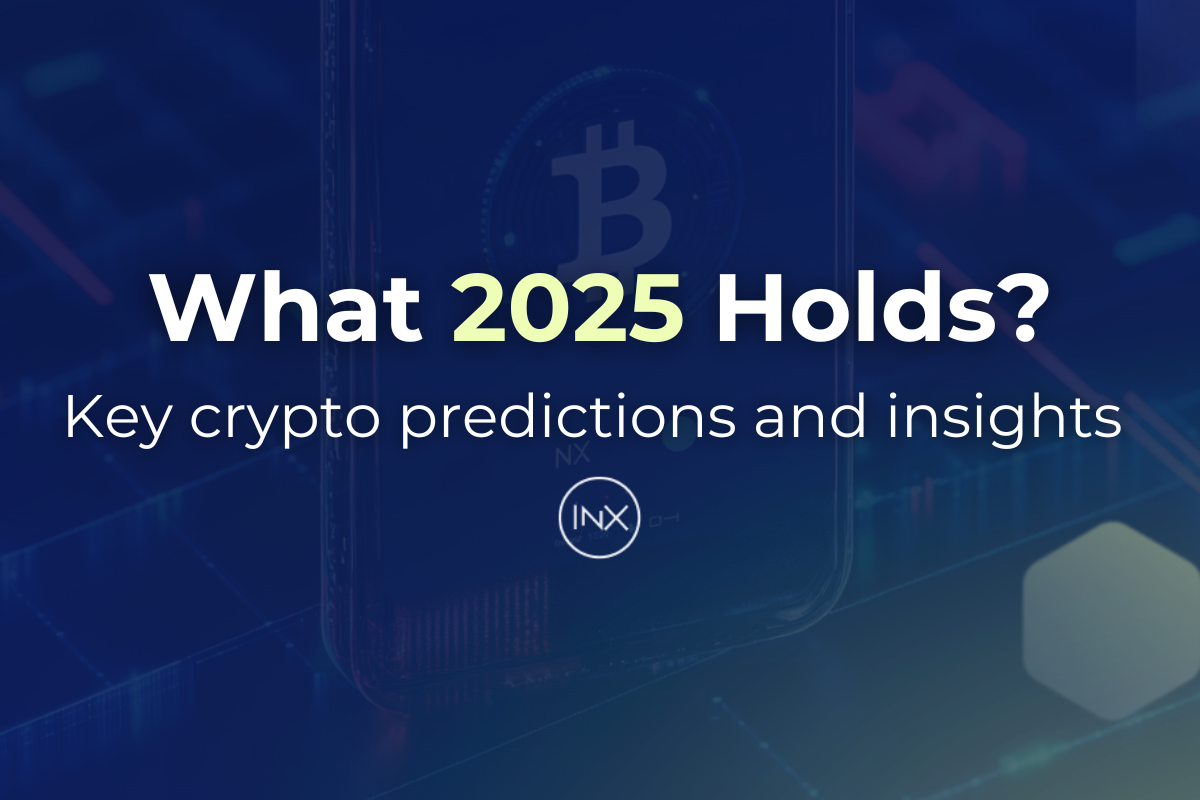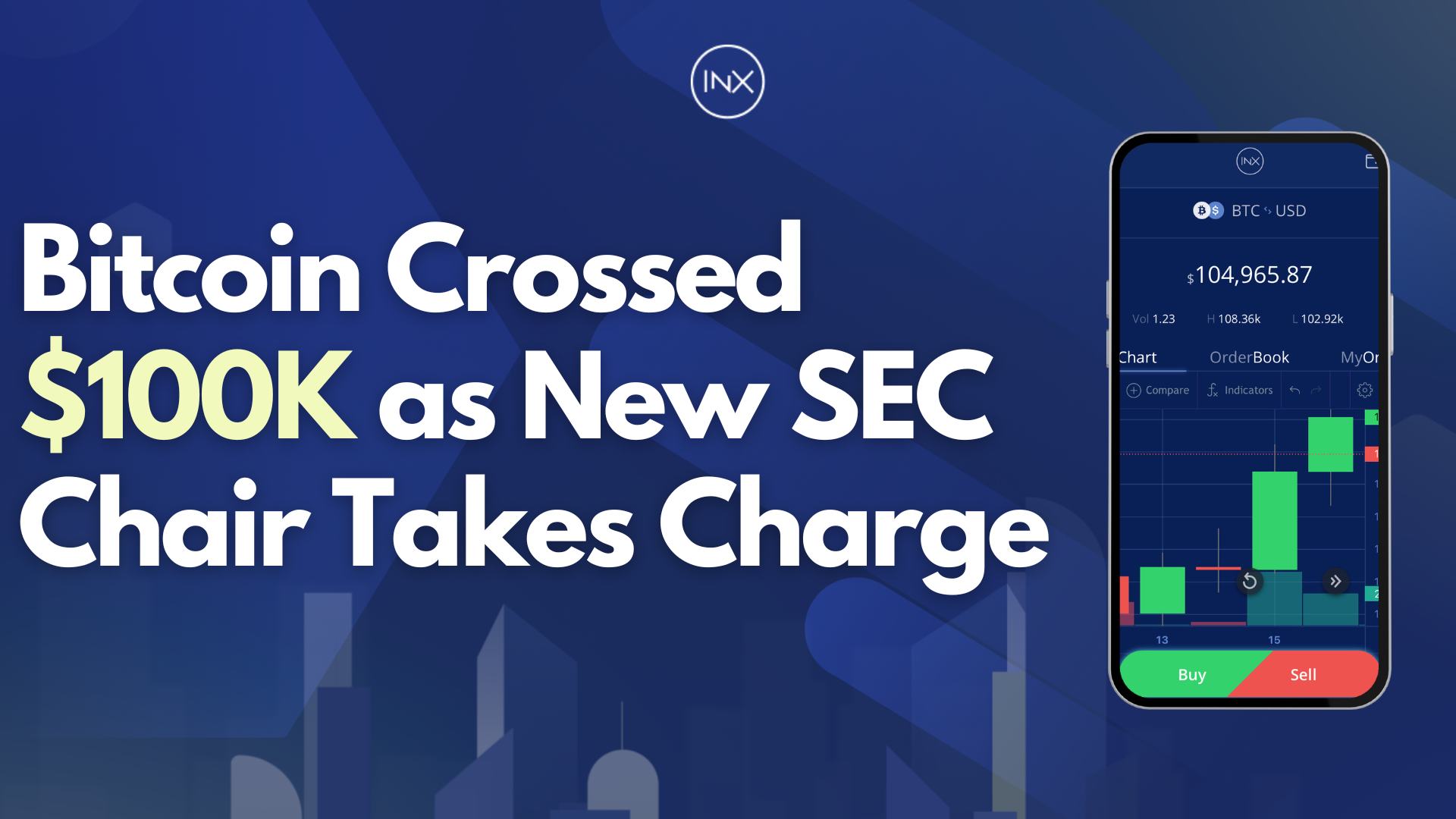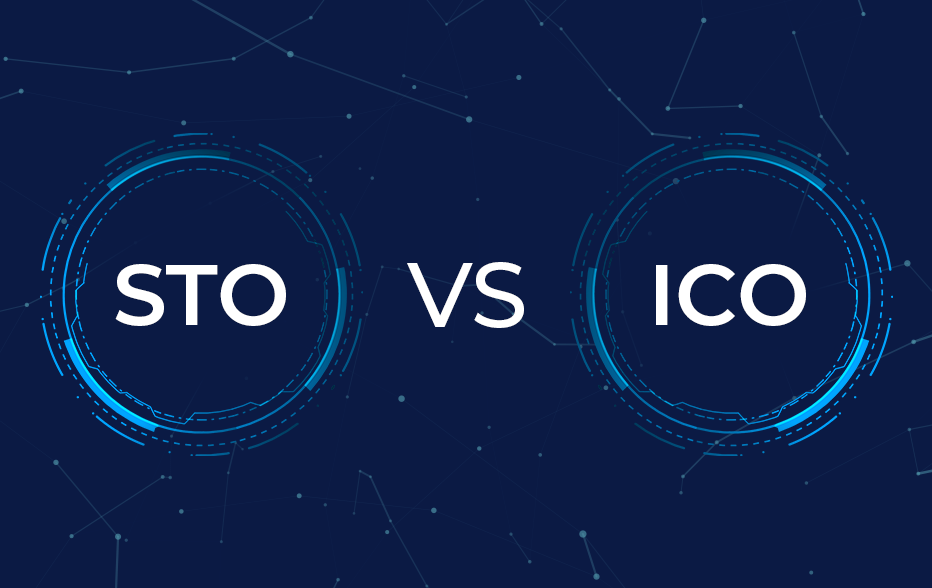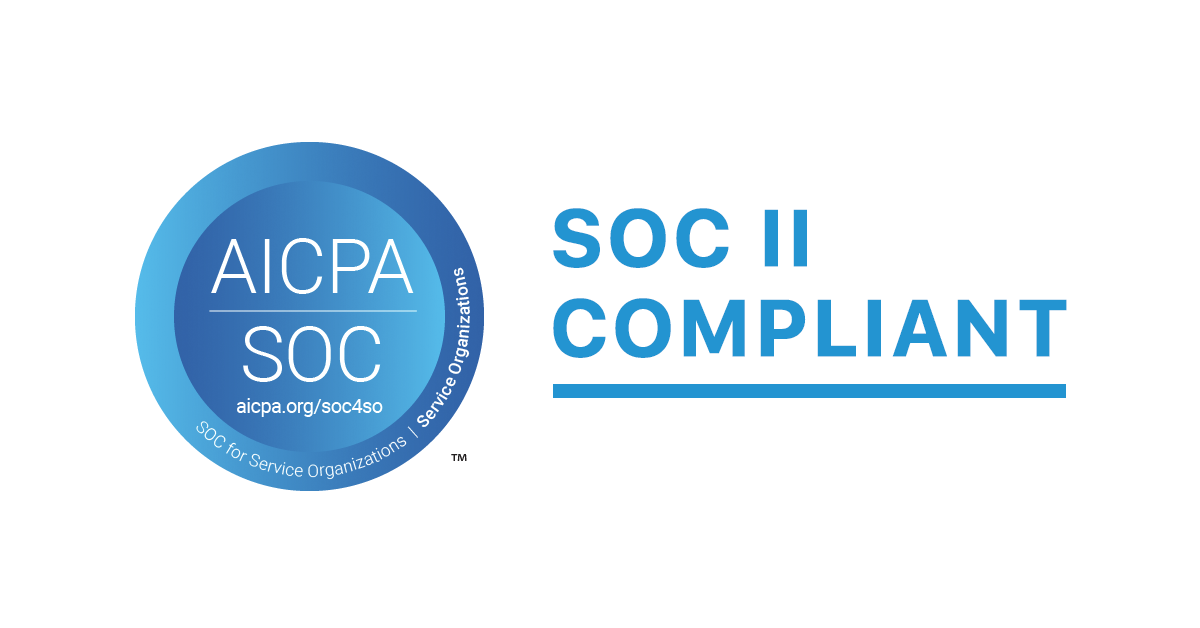Top 10 Categories of Web3 Companies You Need to Know in 2023
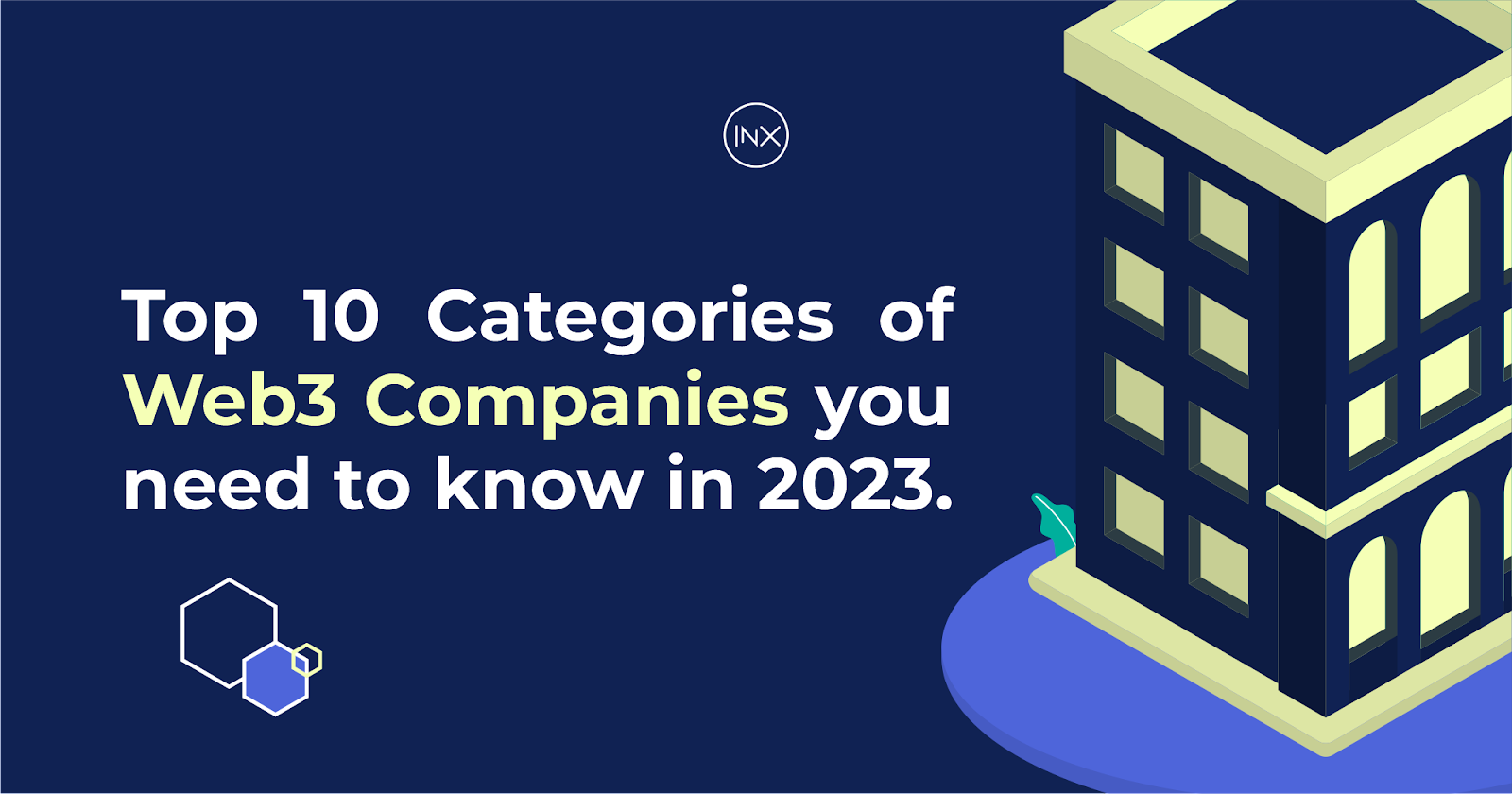
A new frontier is emerging in the digital space, one that promises to refine our online experiences – Web3. Imagine a world where you’re not just a passive user but an active participant, where you have a stake, a voice, and true ownership. This isn’t a glimpse into a distant future; it’s the revolutionary promise of Web3.
In this article, we dive into this new ecosystem to shine a light on the companies leading the charge for the next web iteration.
What is a Web3 Company?
Web3 has become a buzzword or an umbrella term for everything that has to do with the vision of the new iteration of the web. This includes concepts like decentralization, token-based economies, the Metaverse, and blockchain technologies.
So, a Web3 company offers products/services that champion these concepts, including decentralization, transparency, and user empowerment.
Unlike Web2 entities, Web3 companies use blockchain technology to grant users ownership of their data and transactions. The goal of Web3 companies is to construct the next iteration of the Internet as we know it – a decentralized Internet.
With the decentralized web, trust is not vested in intermediaries but in transparent protocols and consensus mechanisms. In the next section, we cover the properties of a great Web3 company.
What makes a Web3 company great?
A great Web3 company is one that has all the following properties:
- Decentralization: A great Web3 company is usually not controlled by a central authority. Instead, it will have a community of stakeholders that can publicly vote on decisions.
- Transparency: Transactions and changes are publicly recorded on a blockchain and are immutable (cannot be changed). This addresses the privacy issue of Web2 companies; anybody can verify data on a public blockchain.
- User Empowerment: One of the significant problems with Web2 is data mining and the inability of users to control their data. Web3 aims to change that; it is about returning power to users. A great Web3 company allows users to control their data, assets, and interactions.
- Innovation: Web3 is all about innovation – solving the shortcomings of the internet as we know it. Therefore, a great Web3 company should address Web2 limitations with novel decentralized solutions.
- Trust: A great Web3 company is a trusted entity with a track record of security and regulations. Whether they’re decentralized or centralized, security is an essential part of their product/service.
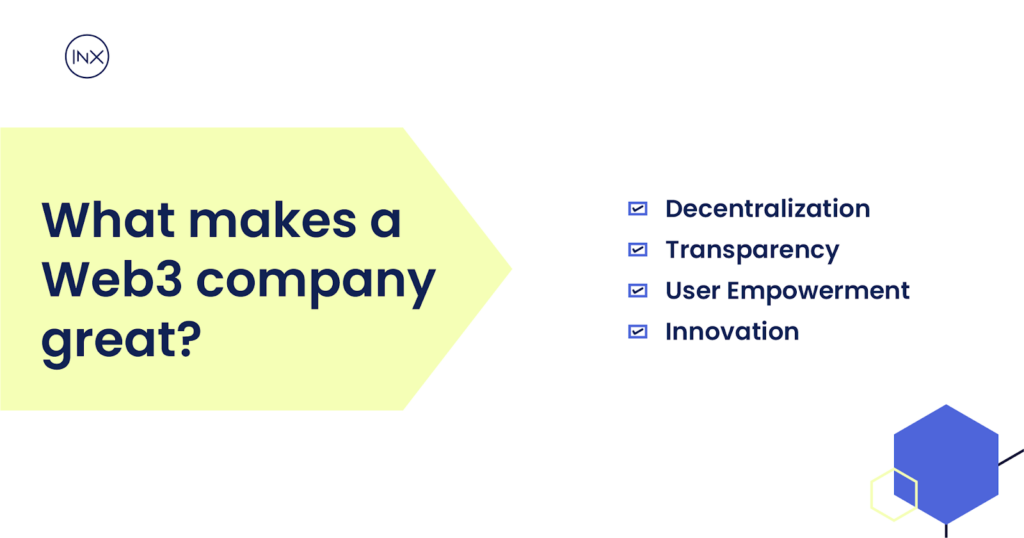
Top Web3 companies in 2023
In this section, we’ll cover the top Web3 companies in the different areas of the Web3 ecosystem. These companies are leading and making waves in their respective sectors.
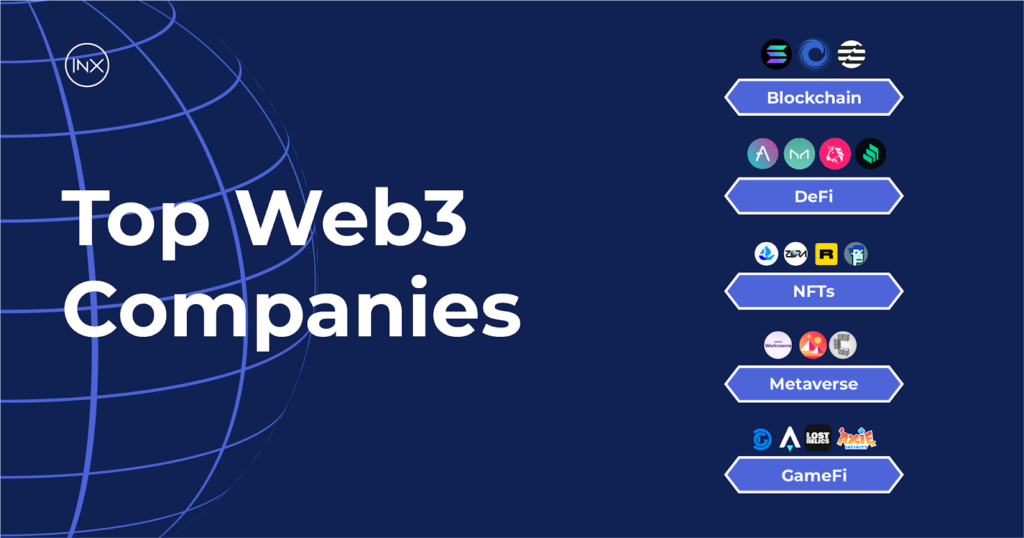
Layer-1 and Layer-2 Blockchain Companies
Blockchain companies are businesses that leverage blockchain technology to offer products, services, or platforms. Blockchain is a decentralized ledger of transactions distributed across multiple computers (nodes) to ensure data transparency, security, and immutability. These companies lay the foundation for other Web3 technologies. The top five Blockchains include:
- Consensys: Consensys was founded by Joseph Lubin, a co-founder of Ethereum in 2014 and has since then been at the forefront of innovation in the Web3 space. The company created Ethereum, Metamask, and a suite of other tools designed to help developers build a global ecosystem.
- Polygon Labs: Polygon Labs is behind the popular layer-2 blockchain – Polygon. Polygon is a sidechain scaling solution for the Ethereum blockchain and is designed to help with faster transactions with lower costs on Ethereum.
- Offchain Labs: Offchain Labs is behind the layer-2 blockchain, Arbitrum, which is a scaling solution for Ethereum. Arbitrum uses optimistic rollups, which include executing transactions off-chain before submitting them on the Ethereum mainnet.
- Mysten Lab: Mysten Labs is behind the layer-1 blockchain – Sui. Sui is a decentralized and permissionless (public) blockchain built to support a wide range of applications. The blockchain uses Move language to execute smart contracts.
- Aptos Labs: Aptos Labs was developed by former Facebook (Meta) employees, and the layer-1 Blockchain focuses on delivering high throughput and security for smart contracts. The Blockchain uses the Move language and proof-of-stake (PoS) to do that.
- Solana: Solana is layer-1 blockchain and stands out for its incredible speed and low transaction costs, achieved through a unique combination of technologies like Proof of History (PoH) and Tower BFT.
Decentralized Finance (DeFi)
DeFi, short for “Decentralized Finance,” refers to creating an open-source, permissionless, and transparent financial service ecosystem without the need for traditional financial intermediaries like banks, brokers, or insurance companies.
DeFi companies/protocols offer the resources to help users utilize this decentralized ecosystem. They are primarily built on the Ethereum blockchain, though other blockchains have also started supporting DeFi projects. Examples include:
- MakerDAO: A decentralized credit platform where users can borrow against collateral. It’s known for its stablecoin, DAI, pegged to the US dollar.
- Compound: Compound is a decentralized finance protocol that allows users to lend and borrow cryptocurrencies. Lenders provide funds to the market to earn interest, while borrowers can take loans by providing crypto as collateral. Interest rates are algorithmically adjusted based on supply and demand.
- Aave: Aave is a decentralized lending system that allows users to lend, borrow, and earn interest on crypto assets. Unlike traditional banking systems, Aave operates without intermediaries, offering more competitive rates. It also introduced unique features like “flash loans,” which allow borrowing without collateral for a short period.
- Uniswap: Uniswap is a decentralized exchange that operates on the Ethereum blockchain. It uses a unique automated liquidity protocol, allowing users to trade without intermediaries.
- Yearn.Finance: Yearn.Finance, often simply called Yearn, is a suite of DeFi products that provides lending aggregation, yield generation, and insurance. Its main product, yVaults, allows users to deposit tokens and earn yield, as the protocol automatically shifts these deposits between various DeFi lending protocols to maximize returns.
Non-Fungible Tokens (NFTs)
NFTs, or Non-Fungible Tokens, represent unique digital assets verified using blockchain technology. Unlike cryptocurrencies such as Bitcoin or Ethereum, which are fungible and can be exchanged on a one-for-one basis, NFTs are distinct and cannot be exchanged on a like-for-like basis.
NFT companies are businesses that operate within the realm of these unique tokens, offering platforms, services, or products related to the creation, sale, and management of NFTs.
- OpenSea: OpenSea is the largest and most comprehensive marketplace for NFTs, allowing users to buy, sell, and trade unique digital assets. From art and music to domain names and virtual real estate, OpenSea provides a platform for a wide range of digital collectibles. Its decentralized nature ensures that users have full ownership and control over their assets.
- Rarible: Rarible is a decentralized platform where users can mint, buy, and sell NFTs. What sets Rarible apart is its governance token, RARI, which gives the community a voice in the platform’s development and features. This democratic approach ensures that the platform evolves based on user needs and preferences.
- Foundation: Foundation is a creative platform and marketplace that bridges the gap between digital artists and collectors. It offers a curated selection of digital art, allowing artists to tokenize their work and sell it as NFTs. The platform has gained popularity for its exclusive drops and collaborations with renowned digital artists.
- Zora: Zora is a decentralized pricing and exchange protocol for minting and exchanging NFTs. It introduces a unique pricing model where the price of an NFT is determined by its demand, ensuring that creators benefit from the secondary sales of their work.
- Yuga Labs: Yuga Labs is known for its development of NFTs (Non-Fungible Tokens) and digital collectibles. The company is behind Cryptopunks, one of the first NFT projects on the Ethereum blockchain, representing 10,000 unique 24×24 pixel art images.
Metaverse
The Metaverse refers to a collective virtual shared space created by the convergence of virtually enhanced physical reality and physically persistent virtual reality. In simpler terms, it’s a universe of digital twins of physical reality, combined with virtual reality, where users can interact with a computer-generated environment and other users.
Metaverse companies are those that are building, facilitating, or operating within this digital universe.
- Decentraland: A virtual world where users buy, develop, and sell land parcels. Decentraland offers a platform for creators to develop interactive 3D content and uses the MANA cryptocurrency to power its ecosystem.
- CryptoVoxels: A virtual city on the Ethereum blockchain where users can build and explore. CryptoVoxels allows users to develop and customize their environments, integrating NFT art and creations.
- Somnium Space: Somnium Space is a virtual reality world where users can own land, create avatars, and interact with other users. It offers a fully immersive experience, with blockchain-backed assets ensuring true ownership and the potential for monetization.
- The Sandbox: The Sandbox is a virtual world where players can create, own, and monetize their gaming experiences. Using the platform’s native tools, users can design assets and game experiences, tokenize them as NFTs, and offer them in the platform’s marketplace.
- Horizon Workrooms: Developed by Facebook (now Meta), Horizon Workrooms is a virtual reality space designed for collaborative work. It offers an immersive environment for meetings, brainstorming sessions, and team collaborations, redefining the concept of remote work.
GameFi
GameFi, a fusion of “gaming” and “finance,” refers to the intersection of blockchain-based financial mechanisms with video games. In GameFi, players can earn real-world value through their in-game activities, achievements, and assets, often in the form of cryptocurrencies or NFTs (Non-Fungible Tokens).
This “play-to-earn” model revolutionizes the gaming industry by providing players with tangible rewards for their time and effort.
- Axie Infinity: Axie Infinity is a game where players collect, breed, and battle fantasy creatures called Axies. It has introduced the play-to-earn model, where players can earn cryptocurrency by participating in the game, making it a fusion of gaming and finance.
- The Sandbox: Beyond being a virtual world, The Sandbox is also a game platform where players can design, own, and monetize their game experiences. It offers a suite of tools for game development, allowing users to create unique experiences and tokenize them as NFTs.
- Star Atlas: Star Atlas is a grand strategy game set in a vast outer space universe. Players can explore galaxies, engage in space battles, and own intergalactic assets. The game uses gameFi technology that allows players to own and trade their in-game assets truly.
- Decentral Games: Decentral Games offers a range of play-to-earn games governed by a DAO. Players can earn rewards, own land, and have a say in the platform’s development, making it a blend of gaming, finance, and governance.
- Lost Relics: Lost Relics is an action-adventure RPG that incorporates blockchain-backed items. Players can discover unique in-game items, tokenize them as NFTs, and trade them in various marketplaces.
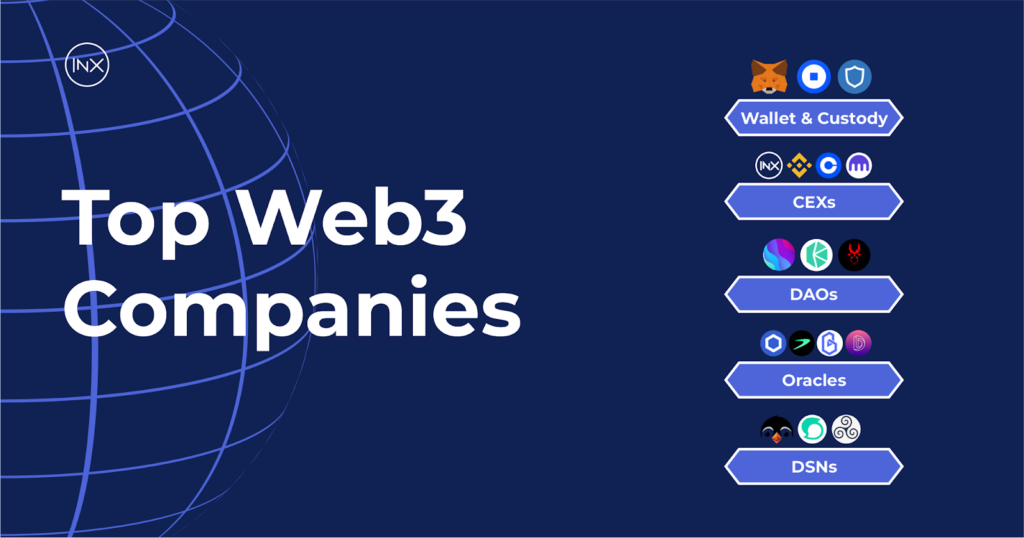
Wallet and Custody
Wallet providers offer digital solutions that allow users to store, manage, and transact with cryptocurrencies. These wallets can be software-based (online, desktop, or mobile) or hardware-based (physical devices). Here
- ZenGo: ZenGo is a pioneering mobile cryptocurrency wallet emphasizing simplicity, security, and user experience. One of its standout features is its keyless security infrastructure, which eliminates the traditional private key in favor of threshold cryptography.
- Ledger/Ledger Live: Ledger offers a secure hardware wallet for storing and securing your crypto. Ledger Live is the official companion app for Ledger hardware wallets. It provides an interface for users to manage their assets, check balances, and perform transactions. Given the security reputation of Ledger hardware devices, Ledger Live offers a trusted environment for crypto management.
- Trezor: The Trezor wallet allows users to store multiple cryptocurrency assets offline, ensuring they’re safe from online hacks. With its physical device, Trezor provides a combination of secure cold storage with the convenience of a hot wallet, making it a popular choice for those serious about crypto security.
- BitGo: Established in 2013, BitGo was the first company to introduce multi-signature technology to Bitcoin transactions, setting industry standards for cryptocurrency security. Their platform offers both hot wallets and cold storage solutions, ensuring assets are safe yet accessible.
- Fireblocks: Fireblocks offers an enterprise-grade platform that delivers a secure infrastructure for moving, storing, and issuing digital assets. Fireblocks provides an end-to-end solution with advanced security and a clear user interface, ensuring digital assets are secure from potential attacks.
Centralized Exchanges (CEXs)
Centralized exchanges (CEX) are online platforms where users can buy, sell, or trade cryptocurrencies.
Unlike decentralized exchanges (DEX), which operate without a central authority and facilitate direct peer-to-peer transactions, centralized exchanges are managed by a centralized organization or company. This central entity oversees the operations, maintains the platform, and ensures liquidity and order matching.
- INX: INX is a US-regulated exchange for trading cryptocurrencies and security tokens. The INX.One trading platform gives traders access to multiple assets and investment opportunities.
- Coinbase: Founded in 2012, Coinbase is one of the world’s leading cryptocurrency platforms, offering a suite of services that includes trading, investing, and storing digital assets. Coinbase also offers a self-custody wallet, Coinbase Wallet, a mobile app by Coinbase that allows users to store and manage their cryptocurrencies securely.
- Binance: A global cryptocurrency exchange platform known for its wide range of supported coins. Binance also launched its blockchain, Binance smart chain, in 2020. The blockchain is a high-performance blockchain that is compatible with the EVM (Ethereum Virtual Machine). In addition, Binance also created two wallets; Binance wallet – a centralized hot storage, and Trust wallet – a decentralized hot storage.
- Kraken: Kraken is known for its robust security features and comprehensive fiat currency support. It provides a platform for trading a wide selection of cryptocurrencies and offers additional services like futures trading and staking.
- Bitfinex: Bitfinex is a Hong Kong-based cryptocurrency exchange known for its advanced trading features. It offers a wide selection of coins, margin trading, and a peer-to-peer funding market. Its liquidity and comprehensive charting tools make it popular among professional traders.
- Gemini: Founded by the Winklevoss twins, Gemini emphasizes regulatory compliance and security. It offers a clean interface for trading a curated selection of cryptocurrencies and has expanded its offerings with services like Gemini Earn and the Nifty Gateway for NFTs.
Decentralized Autonomous Organizations (DAOs)
DAOs, or Decentralized Autonomous Organizations, represent a new paradigm in organizational structure, leveraging blockchain technology to create decentralized entities that operate based on pre-defined rules encoded as smart contracts.
DAOs have the potential to revolutionize how organizations are structured and operate, especially in sectors like finance, governance, and community management.
- MolochDAO: MolochDAO is a community-driven organization that funds Ethereum development. It operates on a grant system, where proposals are submitted, and members vote to allocate funds.
- KyberDAO: KyberDAO governs the Kyber Network, a decentralized liquidity protocol. Token holders can participate in governance, proposing and voting on changes to the network.
- dxDAO: dxDAO focuses on DeFi protocols and products. It governs several projects, ensuring that they operate transparently and in the best interests of their users. By leveraging the collective intelligence of its community, dxDAO aims to drive innovation in the DeFi space.
- PieDAO: PieDAO is a decentralized organization that offers asset allocation strategies. It creates tokenized portfolio pies, allowing users to gain exposure to curated baskets of assets.
- GnosisDAO: GnosisDAO governs the Gnosis ecosystem, which focuses on prediction markets and other tools. It leverages the Gnosis platform’s tools to facilitate decentralized decision-making, ensuring that the ecosystem evolves based on collective wisdom.
Oracles
Oracles, in the context of blockchain and smart contracts, refer to systems or services that provide external data to smart contracts.
Since blockchains cannot access data outside their network, oracles act as bridges between the external world and the blockchain, enabling smart contracts to interact with data from the outside world.
- Chainlink Labs: The Chainlink Labs is behind Chainlink, a decentralized oracle network that bridges the gap between smart contracts and real-world data. It allows smart contracts to securely interact with external data feeds, web APIs, and traditional bank payments. Chainlink ensures that smart contracts can operate effectively in real-world scenarios by providing reliable and tamper-proof data inputs.
- BAND: BAND Protocol is a cross-chain data oracle platform that aggregates and connects real-world data and APIs to smart contracts. It ensures that DApps can access reliable and timely data, making them more effective and relevant.
- Tellor: Tellor is a decentralized oracle that provides high-value data for smart contracts on Ethereum. It leverages a network of miners who compete to submit data for requested queries, ensuring that data inputs are decentralized and trustworthy.
- DIA (Decentralized Information Asset): DIA is an open-source Oracle platform that provides transparent data feeds. It aims to bring complete transparency to the data provision process, ensuring that DApps and smart contracts can trust the data they receive.
- Provable: Provable (formerly Oraclize) offers a bridge between the internet and blockchain. It provides data transport from web APIs into blockchain networks, ensuring that smart contracts can access the data they need to operate effectively.
Decentralized Social Networks (DSNs)
Decentralized social networks (DSNs) are platforms that operate on decentralized infrastructure, typically leveraging blockchain technology and peer-to-peer (P2P) systems.
Unlike traditional centralized social networks, where a single entity (e.g., Facebook, Twitter) controls the platform, data, and governance, decentralized social networks distribute control and ownership across their user base. Below are the leading DSNs you should know:
- Lens Protocol: The Lens protocol is a decentralized social graph that allows developers to build decentralized social media with ease.
- Mastodon: An open-source, decentralized social network where users can host their own servers or join existing ones.
- Peepeth: A decentralized microblogging platform built on the Ethereum blockchain.
- Steemit: A blockchain-based blogging and social media platform where users can earn cryptocurrency for creating and curating content.
- Akasha: A decentralized social networking platform built on Ethereum and IPFS (InterPlanetary File System).
Conclusion
The Web3 landscape is vast and ever-evolving, with companies spanning various sectors. From blockchain platforms to GameFi innovations, these entities are shaping the future of the decentralized internet. As we journey through the Web3 era, understanding these trailblazers becomes crucial for anyone keen on the digital realm’s future.
The INX Digital Company INC September 13, 2023
The INX Digital Company inc. is an expert in the field of finance, crypto and digital securities.
